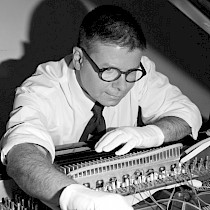Prof. Dr. Eduardo R. Miranda

Artificial Intelligence Music with Biocomputing
Eduardo R.Miranda is a composer and Artificial Intelligence (AI) scientist working at the crossroads of biology and music. He studied Music Technology at the University of York and received a PhD on the topic of musical composition with AI from the University of Edinburgh. Currently, he is Professor in Computer Music at Plymouth University, UK, where he leads the Interdisciplinary Centre for Computer Music Research (ICCMR), which is pioneering the fields of Music Neurotechnology, and the development of biological and quantum computing for music.
http://neuromusic.soc.plymouth.ac.uk/
Synopsis
Artificial Intelligence Music with Biocomputing
Digital computers are becoming increasingly more powerful, not only in terms of processing speed, but also in terms of their ability to store and process huge amounts of data. This is leading to what is popularly referred to as super-intelligent computers because they can deal with data in ways that are beyond the capabilities of the human brain. And they can make complex calculations at very high speeds. However, intelligence is not only about processing large amount of data very quickly. There certainly are other kinds of intelligence, some of which do not even need much data.
The great majority of research into Artificial Intelligence nowadays is aimed at harnessing the processing power of digital computers to build super-intelligent machines. In contrast, the speaker is interested in exploring the design of new kinds of computers, which are not necessarily digital or more powerful than the human brain. But they might nevertheless do interesting things, or just do things differently; perhaps more creatively.
This talk introduces a new kind of computer that is being developed at the Interdisciplinary Centre for Computer Music Research, University of Plymouth, in the United Kingdom. This new machine, which is referred to as the bio-computer, uses processors grown out of an unicellular organism known as the Physarum polycephalum. The bio-computer works as a living interactive musical instrument. It is able to listen to a musician and produce musical responses in real-time.
The presentation concludes with a short discussion on how the combination between artificial machines and biological organisms is paving the way for the development of new types Artificial Intelligence technologies that blur the distinction between natural and artificial intelligence.The memristor is a relatively less well-known electronic component regarded as a resistor with memory. After an introduction to harnessing the Physarum polycephalum unicellular organism to implement biomemristors, the speaker presents a biocomputer that uses four biomemristors to generate music interactively. An example of a musical composition using the system is detailed.
The talk concludes with a short discussion on how the combination between artificial machines and biological organisms is paving the way for the development of new types Artificial Intelligence technologies for music.
All Speakers
- Fouzia Adjailia
- Claudio Agosti
- Thorsten Bauer
- Vaishak Belle
- Jan Boelen
- Daniel Deboy
- Prof. Dr.-Ing. Barbara Deml
- Hon. Prof. Joséphine Derobe
- Florian Dohmann
- Declan Dowling
- Felix Gaedtke
- Holger Förterer
- Prof. Dennis del Favero
- Owen Green
- Dr. Lily Hibberd
- Alejandra Janus
- Sönke Kirchhof
- Marco Kempf
- Professor J. Stephen Lansing
- Roman Lipski
- Prof. Dr. Eduardo R. Miranda
- Lauren Moffatt
- Prof. Andrea Nanetti
- Jules Rawlinson
- Dave Murray-Rust
- Prof. Dr. Dr.-Ing. Jivka Ovtcharova
- Gülsel Özkan
- Gayatri Parameswaran
- Eleanora Pfanz
- Hans-Martin Rall
- Prof. Elke Reinhuber
- Dr. Ralf Schäfer
- Dr. Christoph Schneider
- Dr. Markus Schmidt
- Patrick Scislowski
- Kathleen Schröter
- Prof. Aljoscha Smolic
- Prof. Vibeke Sorensen
- Will Stronge
- Holger Volland
- Prof. Charles Wang
- Yulu Wang
- Dr. Matthias Wölfel
- Tobias Wursthorn
- Wang Zhigang PH.D
Contact
Interesse? Fragen?
Schreiben Sie uns:
info@beyond-festival.com




